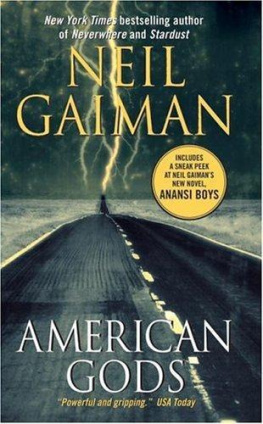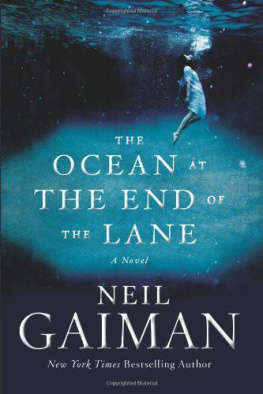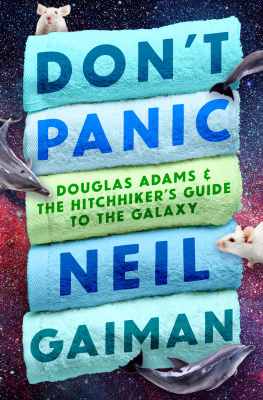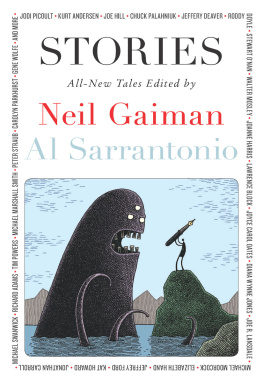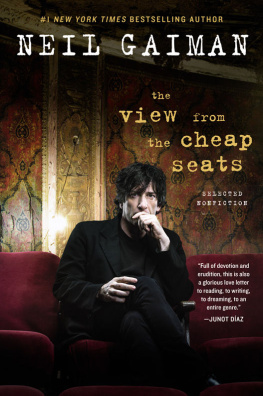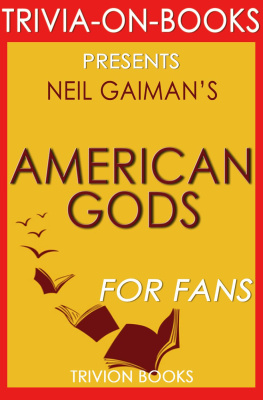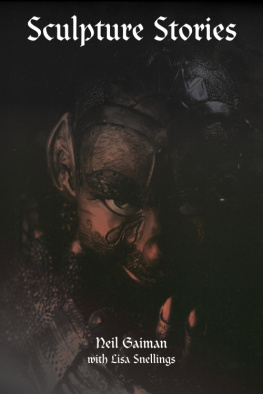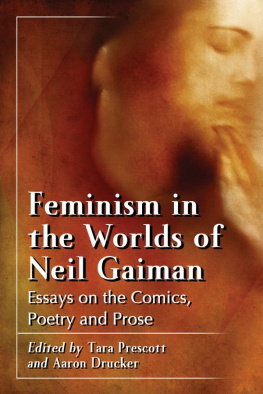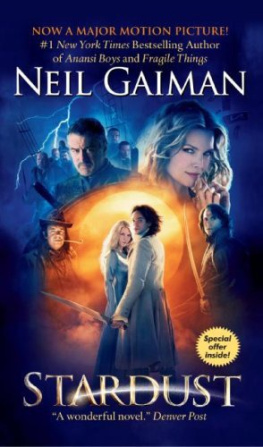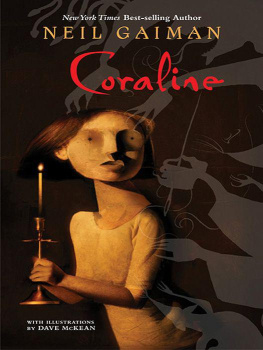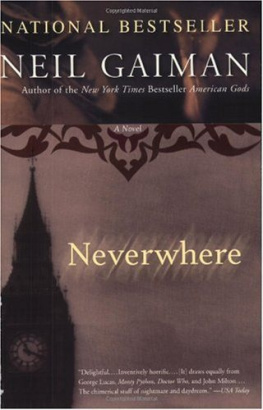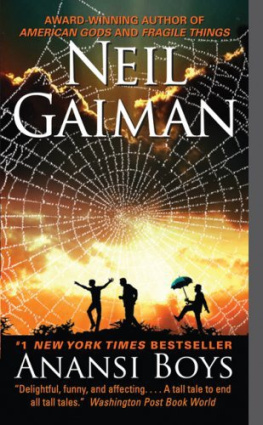Neil Gaiman - American Gods
Here you can read online Neil Gaiman - American Gods full text of the book (entire story) in english for free. Download pdf and epub, get meaning, cover and reviews about this ebook. publisher: HarperTorch, genre: History / Science. Description of the work, (preface) as well as reviews are available. Best literature library LitArk.com created for fans of good reading and offers a wide selection of genres:
Romance novel
Science fiction
Adventure
Detective
Science
History
Home and family
Prose
Art
Politics
Computer
Non-fiction
Religion
Business
Children
Humor
Choose a favorite category and find really read worthwhile books. Enjoy immersion in the world of imagination, feel the emotions of the characters or learn something new for yourself, make an fascinating discovery.
- Book:American Gods
- Author:
- Publisher:HarperTorch
- Genre:
- Rating:3 / 5
- Favourites:Add to favourites
- Your mark:
- 60
- 1
- 2
- 3
- 4
- 5
American Gods: summary, description and annotation
We offer to read an annotation, description, summary or preface (depends on what the author of the book "American Gods" wrote himself). If you haven't found the necessary information about the book — write in the comments, we will try to find it.
American Gods — read online for free the complete book (whole text) full work
Below is the text of the book, divided by pages. System saving the place of the last page read, allows you to conveniently read the book "American Gods" online for free, without having to search again every time where you left off. Put a bookmark, and you can go to the page where you finished reading at any time.
Font size:
Interval:
Bookmark:
American Gods
By
Neil Gaiman


"All we have to believe with is our senses, the tools we use to perceive the world: our sight, our touch, our memory. If they lie to us, then nothing can be trusted. And even if we do not believe, then still we cannot travel in any other way than the road our senses show us; and we must walk that road to the end."
The boundaries of our country, sir? Why sir, on the north we are bounded by the Aurora Borealis, on the east we are bounded by the rising sun, on the south we are bounded by the procession of the Equinoxes, and on the west by the day of judgement.
-The American Joe Millers Jest Book
Shadow had done three years in prison. He was big enough and looked don't-fuck-with-me enough that his biggest problem was killing time. So he kept himself in shape, and taught himself coin tricks, and thought a lot about how much he loved his wife.
The best thing-in Shadow's opinion, perhaps the only good thing-about being in prison was a feeling of relief. The feeling that he'd plunged as low as he could plunge and he'd hit bottom. He didn't worry that the man was going to get him, because the man had got him. He was no longer scared of what tomorrow might bring, because yesterday had brought it.
It did not matter, Shadow decided, if you had done what you had been convicted of or not. In his experience everyone he met in prison was aggrieved about something: there was always something the authorities had got wrong, something they said you did when you didn't-or you didn't do quite like they said you did. What was important was that they had gotten you.
He had noticed it in the first few days, when everything, from the slang to the bad food, was new. Despite the misery and the utter skin-crawling horror of incarceration, he was breathing relief.
Shadow tried not to talk too much. Somewhere around the middle of year two he mentioned his theory to Low Key Lyesmith, his cellmate.
Low Key, who was a grifter from Minnesota, smiled his scarred smile. "Yeah," he said. "That's true. It's even better when you've been sentenced to death. That's when you remember the jokes about the guys who kicked their boots off as the noose flipped around their necks, because their friends always told them they'd die with their boots on."
"Is that a joke?" asked Shadow.
"Damn right. Gallows humor. Best kind there is."
"When did they last hang a man in this state?" asked Shadow.
"How the hell should I know?" Lyesmith kept his orange-blond hair pretty much shaved. You could see the lines of his skull. "Tell you what, though. This country started going to hell when they stopped hanging folks. No gallows dirt. No gallows deals."
Shadow shrugged. He could see nothing romantic in a death sentence.
If you didn't have a death sentence, he decided, then prison was, at best, only a temporary reprieve from life, for two reasons. First, life creeps back into prison. There are always places to go further down. Life goes on. And second, if you just hang in there, someday they're going to have to let you out.
In the beginning it was too far away for Shadow to focus on. Then it became a distant beam of hope, and he learned how to tell himself "this too shall pass" when the prison shit went down, as prison shit always did. One day the magic door would open and he'd walk through it. So he marked off the days on his Songbirds of North America calendar, which was the only calendar they sold in the prison commissary, and the sun went down and he didn't see it and the sun came up and he didn't see it. He practiced coin tricks from a book he found in the wasteland of the prison library; and he worked out; and he made lists in his head of what he'd do when he got out of prison.
Shadow's lists got shorter and shorter. After two years he had it down to three things.
First, he was going to take a bath. A real, long, serious soak, in a tub with bubbles. Maybe read the paper, maybe not. Some days he thought one way, some days the other.
Second, he was going to towel himself off, put on a robe. Maybe slippers. He liked the idea of slippers. If he smoked he would be smoking a pipe about now, but he didn't smoke. He would pick up his wife in his arms ("Puppy," she would squeal in mock horror and real delight, "what are you doing?). He would carry her into the bedroom, and close the door. They'd call out for pizzas if they got hungry.
Third, after he and Laura had come out of the bedroom, maybe a couple of days later, he was going to keep his head down and stay out of trouble for the rest of his life.
"And then you'll be happy?" asked Low Key Lyesmith. That day they were working in the prison shop, assembling bird feeders, which was barely more interesting than stamping out license plates.
"Call no man happy," said Shadow, "until he is dead."
"Herodotus," said Low Key. "Hey. You're learning."
"Who the fuck's Herodotus?" asked the Iceman, slotting together the sides of a bird feeder and passing it to Shadow, who bolted and screwed it tight.
"Dead Greek," said Shadow.
"My last girlfriend was Greek," said the Iceman. "The shit her family ate. You would not believe. Like rice wrapped in leaves. Shit like that."
The Iceman was the same size and shape as a Coke machine, with blue eyes and hair so blond it was almost white. He had beaten the crap out of some guy who had made the mistake of copping a feel off his girlfriend in the bar where she danced and the Iceman bounced. The guy's friends had called the police, who arrested the Iceman and ran a check on him which revealed that the Iceman had walked from a work-release program eighteen months earlier.
"So what was I supposed to do?" asked the Iceman, aggrieved, when he had told Shadow the whole sad tale. "I'd told him she was my girlfriend. Was I supposed to let him disrespect me like that? Was I? I mean, he had his hands all over her."
Shadow had said, "You tell 'em," and left it at that. One thing he had learned early, you do your own time in prison. You don't do anyone else's time for them.
Keep your head down. Do your own time.
Lyesmith had loaned Shadow a battered paperback copy of Herodotus's Histories several months earlier. "It's not boring. It's cool," he said, when Shadow protested that he didn't read books. "Read it first, then tell me it's cool."
Shadow had made a face, but he had started to read, and had found himself hooked against his will.
"Greeks," said the Iceman, with disgust. "And it ain't true what they say about them, neither. I tried giving it to my girlfriend in the ass, she almost clawed my eyes out."
Lyesmith was transferred one day, without warning. He left Shadow his copy of Herodotus. There was a nickel hidden in the pages. Coins were contraband: you can sharpen the edges against a stone, slice open someone's face in a fight. Shadow didn't want a weapon; Shadow just wanted something to do with his hands.
Shadow was not superstitious. He did not believe in anything he could not see. Still, he could feel disaster hovering above the prison in those final weeks, just as he had felt it in the days before the robbery. There was a hollowness in the pit of his stomach that he told himself was simply a fear of going back to the world on the outside. But he could not be sure. He was more paranoid than usual, and in prison usual is very, and is a survival skill. Shadow became more quiet, more shadowy, than ever. He found himself watching the body language of the guards, of the other inmates, searching for a clue to the bad thing that was going to happen, as he was certain that it would.
Next pageFont size:
Interval:
Bookmark:
Similar books «American Gods»
Look at similar books to American Gods. We have selected literature similar in name and meaning in the hope of providing readers with more options to find new, interesting, not yet read works.
Discussion, reviews of the book American Gods and just readers' own opinions. Leave your comments, write what you think about the work, its meaning or the main characters. Specify what exactly you liked and what you didn't like, and why you think so.

